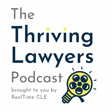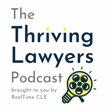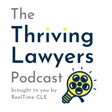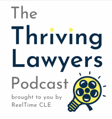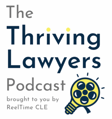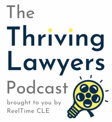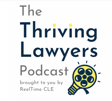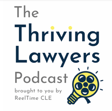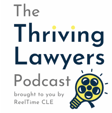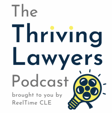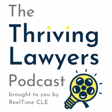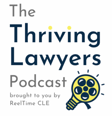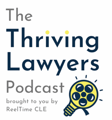Become a Creator today!Start creating today - Share your story with the world!
Start for free
00:00:00
00:00:01

Katherine Adamenko, Ropes & Gray-- Winning with Well-Being in BigLaw (Pt. 2)
Join Michael Kahn for part 2 of his informative and lively interview with Katherine Adamenko, the Manager of Well-being for Ropes & Gray, an international law firm with 1400 lawyers.
Transcript
Thriving Lawyers through Positive Psychology
00:00:02
Speaker
other piece, which is, you know, no coincidence. I'm on the thriving thriving lawyers podcast is that we're taking a page from positive psychology. And rather than focusing or calling things like anxiety workshop or burnout workshop, we want to start focusing on what makes a thriving lawyer. What are they like? What can people aim for? Because
00:00:29
Speaker
If a situation like this is going to be ongoing, for example, dealing with this uncertainty, you know, we have to get it in our heads, oh, this is this new normal and I'm going to still thrive, right? Or who are those people, the firm who are thriving and how can we emulate them and teaching people those skills?
Shift in Legal Culture towards Well-being
00:00:50
Speaker
Welcome back to The Thriving Lawyers Podcast. In this week's episode, join Michael Kahn for an informative and lively interview with Catherine Adamenko, the manager of well-being for Ropes & Grey, an international law firm with 1,400 lawyers. Have you noticed changes? I know you've said that fortunately the legal culture has changed in terms of valuing well-being.
00:01:16
Speaker
Obviously hiring, making, creating a position of manager of well-being, which is awesome. What kind of things have you noticed? What kind of positive changes have you noticed overall in the legal community? And Robes Gray specifically, have you noticed? I'll start with illegal. I'm very active in the legal well-being community.
00:01:41
Speaker
And I'm just so impressed within these few short years, the strong bonded communities. So I'm really grateful to have colleagues at other firms and other leaders coming together as a community.
Impact of Pandemic on Lawyer Well-being
00:02:05
Speaker
And the thing that's come out of it, and then of course,
00:02:09
Speaker
you know, how do we maneuver all of this through the pandemic, which exacerbates so many of the mental health and substance use issues around lawyer wellbeing, right? That kind of already was in crisis mode for, you know, or elevated levels. It really fostered this intense innovation and information sharing that I think I can only hope that is happening
00:02:38
Speaker
in other industries as well. Maybe it's because of just lawyers in general, right? Because it's a fascinating combination of personalities. Just like you mentioned with Chris, right? He's a practicing attorney with a specialization in well-being. You're a former attorney turned counselor. And then you get people like me who are just veteran
00:03:07
Speaker
program managers and a wellness coach, and then you find executive coaches, you get people from attorney development who work only with lawyers. So we're this incredible community. And it's really been about information sharing and innovation to push for solutions, right, during these times. Yeah. So that's not possible. Go ahead, Catherine. Oh, no, no,
Institute for Wellbeing and Law Initiatives
00:03:34
Speaker
go ahead. Sorry.
00:03:36
Speaker
Well, I was going to give a shout out to the Institute for Wellbeing and Law. You mentioned Ann Bradford and Brie Buchanan is the president and Ann is the vice president. But they're out there doing a lot of good work. And I think they're having a conference in 2022. Don't know the exact dates.
00:04:06
Speaker
But you can go to their website, lawyerwellbeing.net. And they even have a podcast, actually. And they've got tons of resources on there. So lawyerwellbeing.net, I would highly recommend. And it looks like, excuse me, I'm on their website now. January 19 to 21 is the inaugural conference, Redesigning the Legal Profession for a Better Future.
00:04:36
Speaker
And then in May, they're having a well-being week in law. So, and you're probably, I think you might be involved with some of this stuff, Catherine, right? I am, yep.
Well-being Week in Law Advisory Role
00:04:46
Speaker
I was really honored to be on the advisory board along with our CHRO, Erica Murphy, from the firm for this past year's well-being week in law.
00:04:57
Speaker
was a panelist around well-being and diversity for the after party. I love it. It made me feel so cool that I was actually at an after party. Of course, this after party was at three o'clock in the afternoon and not three o'clock in the morning. But I was really honored to be part of it.
00:05:19
Speaker
Yeah. And you know, they're, they're like the glue, right? They're, they're the glue. But I will say one other thing. And I think you, that I'd like to share about kind of the, the wellbeing community, a real partner.
Efforts of ABA's CoLab Wellbeing Committee
00:05:33
Speaker
I am on the American Bar Association Commission on Lawyer Assistance Programs CoLab. I'm on their wellbeing committee, specifically working around the wellbeing pledge signatories.
00:05:46
Speaker
And so they play a pivotal role as well. So between the CoLab Wellbeing Committee and now the Institute for Wellbeing and Law, you've got these two incredible organizations working to bring information, resources, experts together, as well as the people, the signatories and the people actually running their programming themselves.
00:06:16
Speaker
So I feel really lucky to be kind of part of both. And the other piece I'll mention, because I want to make sure I mention this before we end, is leveraging, you know, I am speaking right now to any person in charge of wellbeing at their firm, is leveraging the Lawyer Assistance Programs.
Importance of Lawyer Assistance Programs
00:06:37
Speaker
And it's something that we're formally doing at Robson Grid. Yeah. When you say formally doing, what do you mean?
00:06:45
Speaker
So I've reached out to all of our state contacts, and then I've reached internally to our office managing partners at each of our US offices, and key, key people at the office themselves, whether they're part of the Wellbeing Committee, or they're, you know, we have representation from DE&I, Attorney Development,
00:07:10
Speaker
We have key players from each office and then we're setting up a meeting for all of us to meet together and introduce the LEP contact and making sure the leadership in each office knows about the programming and resources available. Yeah, the Lawyer Assistance Programs or
00:07:30
Speaker
It's called Different Things in Some States, Lawyers Concerned for Lawyers in the US and in Canada. It's such a great resource. Of course, I'm biased. I'm a counselor for the LAP in Vancouver, Canada. But just, I've seen firsthand with my clients, but my colleagues, clients, just the benefit of being able to go for free. I don't know if any of them lapse actually charge anything.
00:08:00
Speaker
to be able to do what you did with your director. And I know your director wasn't a counselor, isn't a counselor, but to be able to vent, to talk about, process feelings, concerns, come up with solutions, be held accountable, to have someone who you can commit to saying, I am going to do this between our session today and the next time we meet, and then being accountable the next time to either
00:08:28
Speaker
I did it or I didn't do it and then talk about, well, let's talk about why it didn't happen, not in a judging way, but in a let's figure this out. What were the obstacles and how can you break through them? So I completely agree and I'm glad you brought laps up because they are such a great resource for lawyers. I know some lawyers are hesitant to reach out for help and it can take a little while
00:08:57
Speaker
But once you do, I think listeners out there, you'll find, for the most part, that it will be helpful. So let me ask, speaking of obstacles, what obstacles do there continue to be? And I know we're moving in a very positive direction.
Resilience Amidst Pandemic Uncertainty
00:09:22
Speaker
as far as wellbeing and in the legal culture, what are the continued obstacles that you see, if any? Maybe you're not even seeing any. I think the elephant in the room, right, is the uncertainty around the pandemic. As a coach, one of the things was when I was a wellness coach,
00:09:50
Speaker
I was coaching, um, one of the reasons reasons I love coaching is that you really help people see the light at the end of the tunnel. Right. And only a few weeks ago, there was the light at the end of the tunnel and people were like hybrid work and getting back into routines and socializing and light at the end of the tunnel. And then what do you do when the light dims and lights up and dims and right. And so you're dealing with this, um, I put a bracing, I think that's the thing is, you know,
00:10:20
Speaker
you think, oh, we did so much work on resiliency the last two years. Oh, it looks like we're gonna continue this program, right? Yeah, yeah. Yeah, the uncertainty is so hard. Yeah, the biggest obstacle I think is helping people, you know, weather this storm with such great levels of uncertainty. And that's where resiliency
00:10:48
Speaker
plays a huge piece. And then the other piece, which is no coincidence, I'm on the Thriving Lawyers podcast, is that we're taking a page from positive psychology. And rather than focusing or calling things like anxiety workshop or burnout workshop, we want to start focusing on what makes a thriving lawyer. What can people aim for?
00:11:18
Speaker
Because if situation like this is going to be ongoing, for example, dealing with this uncertainty, you know, we have to get it in our heads. Oh, this is this new normal. I'm going to still thrive. Right. Or who are those people, the firm who are thriving and how can we emulate them and teaching people those skills?
00:11:39
Speaker
Yeah I think that's great because we've dealt with adversity now over almost two years and how look back at how we successfully dealt with, coped with the adversity and also at the same time it's important to name the fact that this is hard.
00:11:57
Speaker
that, oh my gosh, really? It's not over yet. I thought, I was seeing this light and now it's dimming to acknowledge that. Yeah, this is discouraging. I certainly have been and am going through the, being discouraged about the Omicron and the fact that it's, we're not done yet. We're not close to done yet, it seems.
00:12:22
Speaker
And that's hard and it can be discouraging. And it's important to acknowledge that too. So I want to, I don't want to forget about, I mentioned when I introduced you the wellbeing and diversity initiative and diversity, and you can speak more to this than me. It's not an accident that you have diversity
00:12:48
Speaker
and integrated into programs on well-being,
Integrating Diversity in Well-being Programs
00:12:51
Speaker
right? So speak a little bit about your thoughts around diversity and well-being and what did that diversity look, what did the initiative look like or what does it look like? Yeah, it was an interesting evolution. We had a workshop with diversity and inclusion expert, Michelle Silverthorne, who I know of her.
00:13:16
Speaker
Oh, highly recommend and she gave a series of workshops and this is, um, you know, especially, um, the timing again, bringing her back and into the firm around the social unrest, um, movement last year. And one workshop she gave in particular, um, talked about the impact of social networks and
00:13:46
Speaker
being like how that can have an impact different from if you're from a diverse background. And a kind of a light bulb went off. And I realized, well, how am I sourcing the people that I want to bring in? How wide is my net? And I kind of had that aha moment, like, you know, I never looked at it through the lens of diversity.
00:14:14
Speaker
in that space, in that way. And I just decided, I basically called my partner in DE&I, which was fantastic because at the time she had been the former co-lead of the New York Wellbeing Committee. So she was already very passionate and committed to wellbeing.
00:14:41
Speaker
and started having conversation with her about it and co-developing just the tenants of what our Wellbeing and Diversity Initiative would be. And, you know, it was, it was, there were a few important things. Number one is making sure that we're casting a wide net when we're looking for instructors and experts. And it's not just in my limited little circle, but it's taking all experiences in.
00:15:10
Speaker
So that was one thing we wanted to do for people of consideration. And then reaching out to others for their recommendations and not just my little go-to people. The other one was making sure that we brought people into the firm that represented everybody at the firm. So that was another piece as well. And then the other one was to really embed it, that it just became practice.
00:15:40
Speaker
that it was really important that I let all the well-being committee, local committees know. I let every vendor we were working with know is that we want to make sure that when you bring people to us, so you're going to work with people that you are considering a wide network of people and not just your specific little network. So that one presentation, that one 10 minute bit of a presentation from Michelle Silverthorne,
00:16:09
Speaker
Just change the trajectory. It was that impactful. And it was around the anti-bias training. Yeah, it was fantastic. Yeah, you're talking about affinity bias, where we just stick with our small circle. And our circles are often folks who look like us and who have similar backgrounds.
00:16:36
Speaker
I think that's wonderful that you're doing that and you have to be intentional about it, right? You definitely, because it can be something that until you're mindful of it and intentional about it, you bring in the same folks. That's really neat that just a short, that short experience with Michelle, that's as a workshop presenter. I love hearing that kind of stuff.
00:17:02
Speaker
the kind of seeds that she planted for you and how they've sprouted. So I want to give us some time, we have a few minutes left, but I want to talk to you and you have been very generous and
00:17:19
Speaker
in some of your personal sharing. What is in some of your self-care?
Guided Exercise for Self-care
00:17:26
Speaker
We talked about you sharing one of your go-tos for your own self-care. So I wanna invite you to do that now. Yeah, and it's funny because it's something I love to teach as much as I love to do. So we are going to practice a compassionate,
00:17:48
Speaker
mindful pause. And so, okay. Yep. So I'm going to ask you and I'm going to ask the listeners just to take a moment and just take in your surroundings, like, okay, I'm here in this room and this is going on. And then now I'm going to ask you to close your eyes or gaze softly at the ground. I, if you can, it's better to close your eyes.
00:18:16
Speaker
And the first thing I notice every time I do this, I just take a deep sigh. It's just kind of automatic, right? And we're going to take a moment now just to be, right? There's nothing to do, nothing to try to do. It's almost like taking your foot off the gas slowly as that car, you know, slowly comes to a stop. And I'm going to ask everybody to take their hand and place it over their heart. It's kind of a universal gesture.
00:18:47
Speaker
of kindness, compassion, and gratitude. And just sit with this feeling. Physical touch is also really important. It's almost as if someone else's hand can be on your heart. The only thing I'm going to ask you to do is say something nice
00:19:17
Speaker
to yourself, maybe thanking yourself for being here today, taking time out for your wellbeing, maybe giving appreciation to your role as a mother or father or sister, brother, or just like, say thank you. And sometimes I'll just get a
00:19:46
Speaker
Little mini smile. Optional, of course. And then when you're ready, open your eyes. You could take your hand off your heart. Open your eyes again, back into the same space you were at. I have noticed a shift. I'm actually sitting up taller. I'm smiling. I feel better. I love that.
00:20:17
Speaker
Excuse me, that was great. Yeah, I feel more relaxed. I did the exercise. Boy, there were so many elements of that that I really liked. I love that car imagery. The cars, taking your foot off of the gas and just imagining the car slowing down, I could even hear. I was imagining my car was on like a dirt road and I could hear that sound when the car slows down on dirt.
00:20:47
Speaker
And the hand on the heart, I agree that's such an important piece, that physical touch with ourselves. And then saying something nice to ourselves, the compassionate piece. We don't have time to talk much about Kristin Neff, but her work and folks want to look her up. I think it's self hyphen compassion dot
00:21:17
Speaker
I think it's .com. Check me out on that one, Catherine. And saying something nice to yourself, and Kristin Neff says it can be even more important to actually use your name as if a friend is saying this nice thing to you or a loved one.
00:21:42
Speaker
So that was a really nice exercise and it only was, what, maybe a couple minutes, Catherine? Yep. Yeah, it's amazing. These little micro interventions, they just add up. And I did look it up. It's self-compassion.org. Got it. Great. Thank you. I encourage everyone to check out Kristin Neff's website and
00:22:09
Speaker
For, as you said, Catherine, when we started, lawyers definitely are about, all right, I need to see some evidence for this stuff you're recommending for me. What's the evidence that this is helpful? Which is completely, I get it. And Kristin Neff has done hundreds, either herself or, you know,
00:22:33
Speaker
has read and integrated other folks' research around the benefits of self-compassion. So I highly recommend you all check that out. That was a great activity, Catherine. And you do that with your lawyers at the firm?
00:22:50
Speaker
Yeah, I do with just about anybody. One of our strategies this year is embedding our program. You're on the street and you just pull something aside and say, hey, let me do this exercise with you right now. I wrote a very conscious email to chiefs and practice group leaders, department heads, basically saying, I can offer
00:23:15
Speaker
you know, mindfulness and yoga and presentations and resource overviews, you know, it's a menu of options. And one of them is, you know, this small little intervention, right at a town hall or to kick off a meeting. And so I've done this or like, if I'm doing a larger presentation, I'll add this piece in sometimes and doing a team meetings. And letting people know, right, this is, you know, these small little interventions, making sure, you know,
00:23:44
Speaker
not asking people to add on well-being, but actually being stealthy, right? So is that stealthy way of getting it in? I like that. We actually had to be stealthy back when we started doing programs around well-being. We had to be stealthy with getting it in. You couldn't even have that in the title about 10 years ago. We had to bring it in through the back door, truly, when we were doing our ethics programs.
00:24:13
Speaker
You couldn't even have the word meditation. Yeah, it would come a long way. Yeah. So and just for the listeners, again, that was called compassionate mindful pause, the exercise that Catherine just did. So Catherine, we're getting towards the end here, but I wanted to ask you if there's anything, any questions that I haven't asked or any information that you'd like to share that
00:24:43
Speaker
you think would be helpful for the listeners to hear? You know what? I thank you for that opportunity. And I will leave you with just, it's for both lawyers and if anybody listening is doing any programming for lawyer wellbeing, I have a new approach, a new strategy. I kind of call it the three E's. And I mentioned one of them as embedding programming, but what's really important, what I learned about while I created this strategy, it's about,
00:25:13
Speaker
expanding access, especially about expanding access to providers, as I mentioned, embedding programming, well-being programming into existing calendars, and then engaging effectively, which, you know, learning how to be a little bit more nimble and partnering with your marketing and communications team, for example, that's for program managers, right? So, you know, really taking that, you know, in making sure you're
Strategies for Expanding Well-being Programs
00:25:43
Speaker
Programming, are you maximizing the resources you have regarding providers? Are you getting the experts to the lawyers themselves? Are you able to bring in other kinds of experts? One of the switches that we're very interested in is when we bring in our CLE programming is now we're really interested in having a practicing attorney
00:26:13
Speaker
talk about it, right? So there's a little bit more of a relation there. Um, but outside of wellbeing, you know, following that strategy for people programming wellbeing, it's funny, I have a slide on this and it has that justice scale, right? It's, it goes both ways. A wellbeing program can have, you can have the best programming in the world, but if you're not teaching the lawyers and legal professionals how to best access it, it's not going to be as much use.
00:26:40
Speaker
So I also kind of make it a dual responsibility. So speaking to now people like lawyers and legal professionals listening to this, are you doing everything you can to get the resources and information that you need, right? Do you know the number of your employee assistance program? Do you know where to reach out to your lawyer assistance program?
00:27:03
Speaker
Have you even registered your medical benefit right online to see a network of providers, right? That's one thing um, you know responsibility if you want more well-being and you're really busy Can you talk to your leader to be like hey at our next team meeting? I'd really love to see love to do a yoga class or I'd love to do some mindfulness Can we bring that into the next monthly meeting that we have?
00:27:27
Speaker
And the other one is, you know, engaging effectively. Are you actually taking part in what you can and are able to take part in? Yeah. And, and to your credit, and we talk about this in, when we talk about wellbeing, that it's of course important to, you only have control over your own wellbeing.
00:27:54
Speaker
And it's important for you to do everything we've talked about here to strengthen and bolster your resilience and your well-being. And it's so important that the cultures of where you work are healthy and encourage that. Because if they're not, then you're really swimming against the tide as an individual. If you're working in an unhealthy place that doesn't value it. Clearly, Rope's Gray values
00:28:24
Speaker
well-being. And that speaks highly of you and of Rose grave as a place to work. So I have one more question for you, Catherine. And what you mentioned resources, are there any, and this is not something I'm putting you a little bit on the spot here, I didn't.
Recommended Resources for Well-being and Resilience
00:28:43
Speaker
didn't tell you to think about this before the podcast. But is there a book or two that you would say you'd recommend to listeners that is focused on wellbeing in some fashion? Yeah, I can recommend is kind of like the go-to place to get all the book recommendations you could ever want and podcasts and articles and resources is the greater good science center.
00:29:12
Speaker
Yes, thank you. Now, one of the reasons is they also have this fabulous I did it like four years ago, the science of happiness class. Yes, that's all about Kristin Neff. Ah, oh, cool. Okay, greater good science center sign up for their newsletter. Um, absolutely. Um, you mentioned Kristin Neff in her book, um, a
00:29:41
Speaker
I am a, I love Kelly McGonigal. She wrote the book, the upside of stress. I have the joy of movement up on my desk, um, on my table here that I haven't gotten to yet. Um, cause there's so many, um, any book by Martin Seligman. And if, you know, I don't, I don't know if you're really a bit nerdy than the book flow by Mahali Cheeksent Mahai.
00:30:08
Speaker
Um, but if you job on that last name, yeah, it's a chick sent behind but again, you'll find that on the greater good sign center, but the book on slow, um, if you put in like flow book, I believe on Google, it'll come up. Um, yeah, and the concepts of flow, you could read a lot about it. Um, yeah, and then the Ted talks, um,
00:30:33
Speaker
Amy Cuddy has one of the most listened to talks on the Power Pose. So Amy Cuddy's concept of the Power Pose. Kelly McGonigal's Ted Talk on why stress should be your friend and her books. Angela Duckworth who wrote Grit is another one. And then my latest favorite I was introduced to by the chair of the firm.
00:31:02
Speaker
is Dr. Lori Santos and her happiness lab podcast. In particular, her two episodes called fun intervention. So, which led me to the book, the power of fun and how to break up with your phone by Catherine Price. So I know I put a handful in there. I love it. That's great. I definitely did not catch you speechless with that question. No, no. You shared a lot of good ones.
00:31:31
Speaker
That's great. And I'll say too, the Greater Good Science Center, absolutely. It may have an additional website called Greater Good in Action. And that lists activities that you can do. So I recommend the Greater Good in Action website as well. Perfect. Well, Catherine, you have already given me more than
00:31:59
Speaker
more than the amount of time I asked you for. So I appreciate your generosity today. It was a pleasure. It went fast as I knew it would. And thank you so much. And I hope our paths cross in person one day. I have family in New Jersey. So next time I'm in the area, I will reach out and maybe we can have coffee.
00:32:23
Speaker
That sounds like a great idea. Or even better, a bagel or a slice of pizza. Oh my God, first of all, yes, I love the bagel or I'll bring some bagels to Vancouver for a nice breakfast. Oh, I like that too. Thank you, Catherine. And we will talk soon.
00:32:44
Speaker
Thanks for listening to this episode of the Thriving Lawyers Podcast. We love hearing from our loyal listeners, so please feel free to email us any questions, comments, suggested topics, or guest recommendations at the following address, feedback at thrivinglawyerspodcast.com.
00:32:59
Speaker
The Thriving Lawyers Podcast is brought to you by Real-Time Creative Learning Experiences, a national provider of continuing legal education and professional development programs that leave participants engaged, encouraged, and equipped to pursue meaningful and sustainable change in their practices, their lives, and the organizations they work in. And by Osborne Conflict Resolution, your experience guides through the uncharted terrain of business and family law disputes based out of Charlotte, North Carolina. Thanks for listening, and we'll see you next time on The Thriving Lawyers Podcast.
